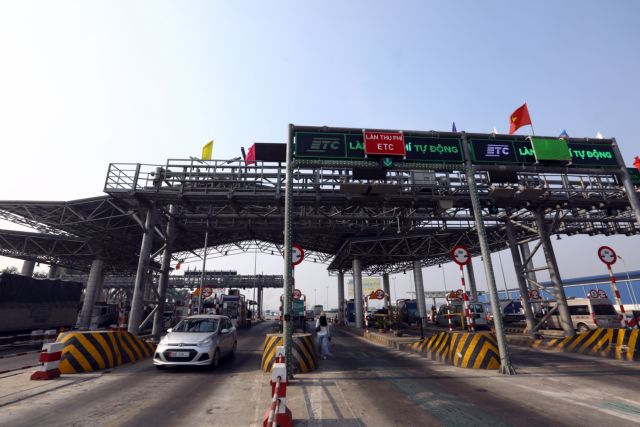 Society
Society

The Ministry of Transport (MoT) has been asked to look at collective and individual responsibilities for delays to a highway electronic toll collection (ETC) project.

|
| A toll plaza on the toll road Hà Nội-Bắc Giang Expressway. — VNA/VNS Photo Huy Hùng |
HÀ NỘI — The Ministry of Transport has been asked to look at collective and individual responsibilities for delays to the implementation of electronic toll collection (ETC) project.
That was the main content of a conclusion document released after a Government meeting earlier this year to review the project that aims to bring transparency to the currently controversial funding model of Build-Operate-Transfer (BOT) in use in Việt Nam.
The ETC project was launched in November 2014 with original total investment of more than VNĐ2 trillion (US$87.6 million).
Implementation of the ETC to replace manual toll booths was deemed necessary by the National Assembly and Prime Minister to create transparency and convenience for road users, as well as ensure traffic order and safety.
The project consisted of two phases.
The first phase was supposed to be implemented by the State-run Việt Nam Electronic Toll Collection Company (VETC) at 44 booths, 26 of which are on a section of the trans-Việt Nam Hồ Chí Minh Highway passing through the Central Highlands, and the rest on other expressways and national highways.
A joint venture of Viettel and other tech enterprises will carry out the second phase at 33 other toll booths.
The system was meant to be in place at all booths nationwide by December 12, 2019.
But as of late last year, the VETC had signed contracts with only 11 of 44 booths as BOT investors were reluctant to hand over lanes to make room for the installation of ETC toll booths.
The main reason for the delay was that profit-sharing rates had not been settled between the VETC and BOT investors.
“This had adversely affected the implementation of the entire system and led to negative feedback from the public,” said the document.
In response, the Government has asked the MoT to clarify exactly who it was that is chiefly responsible for the delay.
March deadline
The Government said the ETC project still needed to be completed by the MoT and relevant agencies and localities.
In order to accelerate the implementation, the Government requested the MoT to immediately install and operate equipment to avoid financial losses.
The ministry and other relevant agencies were also instructed to report to the PM by the end of March, including difficulties, obstacles and proposed plans for the project.
The Committee of State Capital Management was co-ordinating with the MoT to handle any obstacles immediately, the document said. — VNS




